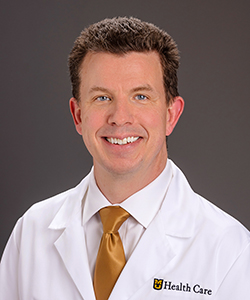September 24, 2025

Life is full of lists. You make a grocery list, so you don't forget ingredients. To-do lists help you stay on task. A cancer prevention checklist is no different. It helps ensure you’re doing everything in your power to prevent cancer from growing or progressing.
A prevention checklist for colorectal cancer is especially critical because taking specific actions may prevent nearly 70% of all colorectal cancer deaths. Since colorectal cancer is the third most commonly diagnosed cancer and the third most common cause of cancer-related death, not taking preventive measures is the real risk.

"For reasons we don't understand, the number of people ages 50 and younger getting colon and rectal cancers is rising," says Dr. Erik Grossmann, an MU Health Care colorectal surgeon. "That's why colorectal cancer screening and prevention are critical, even at a younger age."
Researchers are trying to identify reasons colorectal cancer cases are rising, studying possible associations, including:
- Antibiotic use
- Gut microbiome
- Oral health
- Sleep
- Ultra-processed foods
- Vitamin D deficiency
But before you start taking vitamin D supplements and swearing off antibiotics, Dr. Grossmann cautions you not to get distracted by the new data. "There's not enough evidence supporting these associations yet," he says. "The best way to reduce your risk is to stick to the basics — tried and true colorectal cancer prevention methods."
How to Prevent Colorectal Cancer
Cancer prevention may seem overwhelming. But Dr. Grossmann helped us create a simple checklist to help.
Your colorectal cancer prevention checklist should include:
1. Know Your Family History of Colorectal Cancer
Family history is considered an uncontrollable risk factor — there's nothing you can do to change your DNA. But you can control the preventive actions you take once you know that certain cancers run in your family.
"If you have a first-degree relative — like a sibling, parent or child — who has had colon polyps, colon cancer or uterine cancer, those are all significant risk factors for you," Dr. Grossmann says. Make sure your doctor knows your family history. They can guide you on the preventive actions you should take.
2. Get the Recommended Colorectal Cancer Screening
Colorectal cancer typically starts as polyps — small non-cancerous growths on the lining of your colon or rectum. Most polyps are noncancerous (benign), but others can develop into cancer. While you may never have polyps — and won't feel them if you do — as many as 40% of all adults will have them at some point.
Colorectal cancer screening looks for polyps so they can be removed before they turn into cancer. The United States Preventive Services Task Force (USPSTF) recommends that adults of average risk begin screening at age 45.
The most common screening options include:
- Colonoscopy, a medical procedure in which doctors use a long, flexible camera to look for polyps in your rectum and colon.
- Stool tests, which involve mailing in a stool (poop) sample that you collect at home. Stool tests look for DNA or blood that may suggest there are precancerous or cancerous cells in your colon or rectum.
The Food and Drug Administration (FDA) also recently approved a blood test that will be used for screening colorectal cancer, but it is not yet available to patients.
"Screening for colon polyps is the most powerful way to decrease your colorectal cancer risk," Dr. Grossmann says. "You may lower your risk by as much as 50% if you get the recommended screening. "
Your screening should be covered by insurance. The law requires private insurance companies and Medicare to cover the costs of recommended colorectal cancer screening tests. Always check with your insurance company to see how much, if anything, you'll need to pay.
3. Quit Smoking
Smoking tobacco products like cigarettes increases the risk of developing colon polyps and colorectal cancer. The longer and more often you smoke, the higher your risk. However, you can halt or even lower your cancer risk if you stop smoking.
"There's really good evidence that quitting smoking decreases your colorectal cancer risk," Dr. Grossmann says. "It's not easy to stop smoking, but the benefits to your health are worth it." Resources, such as the MU Health Care Quit Tobacco Now Program, can help.
4. Modify Your Diet
It shouldn't be a surprise that eating healthy keeps you healthier. But if you eat a diet high in red meat, such as beef, pork and lamb, as well as processed meats, you may be increasing your risk of colorectal cancer.
"Research shows that eating more vegetables and less red meat is associated with a lower risk for colorectal cancer," Dr. Grossmann says. Your best bet is to aim for a diet full of fruits, vegetables and whole grains while limiting red meat, processed foods and added sugar.
5. Be Physically Active
Studies show a strong association between physical activity and reduced colorectal cancer risk — in a review of 126 studies, the people who got the most physical activity had a 19% lower colorectal cancer risk. Experts attribute it to the reduced body fat, inflammation and insulin (blood sugar) levels that tend to happen when you exercise consistently.
Aim to get a total of 150 to 300 minutes of moderate-intensity exercise weekly. You should also participate in strength training activities twice weekly and balance training.
6. Maintain a Healthy Body Size
A healthy weight has many health benefits, including cancer prevention. Overweight and obesity are specifically linked to a higher risk of colorectal cancer — especially in men. Having Type 2 diabetes is also associated with increased risk and a worse prognosis in people diagnosed with colorectal cancer.
"Making lifestyle changes is always a good choice for your health, and there are weight loss and weight management services that can help," Dr. Grossmann says. "Many chronic diseases, including colorectal cancer, share many of the same risk factors."
Partnering With Your Doctor to Reduce Colorectal Cancer Risk
If you have a family history of colorectal cancer or are age 40 or older, Dr. Grossmann recommends talking to your doctor about your colorectal cancer risk. They can explain your screening options and help you make healthy lifestyle changes to help reduce your risk.
"Living a healthy lifestyle is important, but for colorectal cancer, those preventive measures are only a drop in the bucket compared to screening for colon polyps," Dr. Grossmann says. "Nearly half our population does not get screened, but it is the absolutely best way to prevent colorectal cancer."
Next Steps and Useful Resources
- Want to discuss your colon cancer risk? Speak with a primary care doctor.
- Want more from Dr. Grossman? See 5 Things I’d Never Do — Advice From a Colorectal Surgeon.


